Experiential Learning Activities of Students
Plant Science Applied Research
Research: Biology and Control of Carolina Redroot in New Jersey Cranberry Bogs
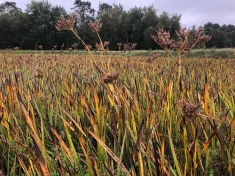
Carolina redroot (Lachnanthes caroliniana) is a perennial weed found in aquatic sandy acidic areas ranging throughout the eastern coast from Louisiana to Nova Scotia. Carolina redroot is a troublesome weed of New Jersey cranberry bogs that can severely outcompete cranberry vines, leading to important economic losses for the growers. Swans and geese wintering in the New Jersey Pine Barrens will also use it as a food source, damaging cranberry vines when digging up Carolina redroot rhizomes.
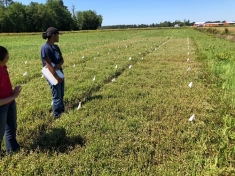
Since 2017, the Weed Science team at the P.E. Marucci Research Center with the help of Rutgers undergraduate students has worked on improving our knowledge of Carolina redroot ecology and biology as well as developing effective methods to control it. Thanks to this research effort, New Jersey cranberry growers have now adopted new tools to minimize the various negative impacts of this weed.
Faculty advisor: Dr. Thierry E. Besançon
Research: Phenotyping Specialty Crops—Amaranth and Roselle
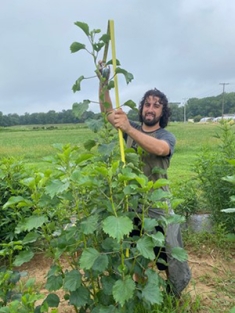
Peter Mahoney is majoring in Plant Biology with a concentration in Natural Products. He works on nutritionally-dense culturally-preferred leafy greens, Amaranth, Roselle and Hibiscus to phenotype varieties of each plant collected from international germplasm banks. Peter is also learning how to propagate Roselle and complete controlled crosses of Amaranth species.
Faculty Advisor: Dr. Jim Simon and Graduate student Tori Rosen
Research: Fungal Resistance of Basil
Trevor Styles is a stellar undergraduate student in the Simon lab working on the improvement of sweet basil and pepper plants through breeding and genomics. He has been an essential member of the lab for 4 years, participating in countless projects in the field and greenhouse. His focus has been on incorporating downy mildew resistance into lemon basils by screening germplasm, advancing generations and overcoming infertility. His interests include plant breeding, horticulture, fieldwork and medicinal and aromatic plants.
Faculty Advisor: Dr. Jim Simon and Graduate student Lara Brindisi.
Identifying and Cataloging Plants in the Floriculture Greenhouse
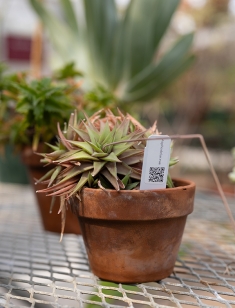
Carly Green has been conducting their Experience-Based Education project to label and catalog the stunning array of plant species in the Floriculture Greenhouse. Each label isn't just a name; it's a gateway to a world of knowledge, enhanced by QR codes that Carly created. These codes link directly to detailed ecological and biological data about each plant on iNaturalist, making each visit interactive and informative. Through this unique learning experience at Rutgers University, Carly has not only enhanced their skills in botanical sciences but also gained invaluable hands-on experience that will undoubtedly propel their future career in Plant Science.
Plant Science Laboratory Research
Research: NJ Pine Barrens, Fungal Diversity and New Fungal Species
Pine barrens is an ecosystem that has acidic, sandy and nutrient-poor soils. The New Jersey Pine Barrens represents one of a series of barrens ecosystems along the eastern seaboard of the United States and one of a series of similar ecosystems around the world. Students have been studying plant root-associated fungi in the pine barrens and uncovered many fungal lineages new to science. To date, we have published a new family, four new genera, and over ten new species. The data indicate that the current sampling effort has uncovered only a fraction of fungal diversity in the pine barrens.
Faculty Advisor: Dr. Ning Zhang
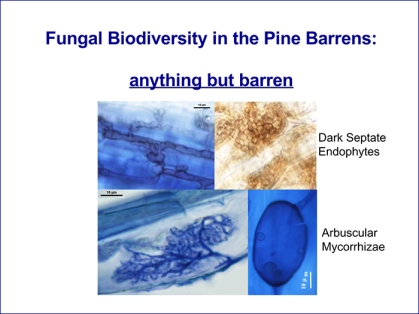
Program Director
Dr. Nrupali Patel
Foran Hall, Rm. 372
848-932-6392
Email: npatel@sebs.rutgers.edu
Martin Hall, Suite 109
848-932-3516
For Prospective Students Contact
Dr. Harna Patel
Teaching Instructor
Foran Hall, Rm. 386
Email: harna.patel@rutgers.edu